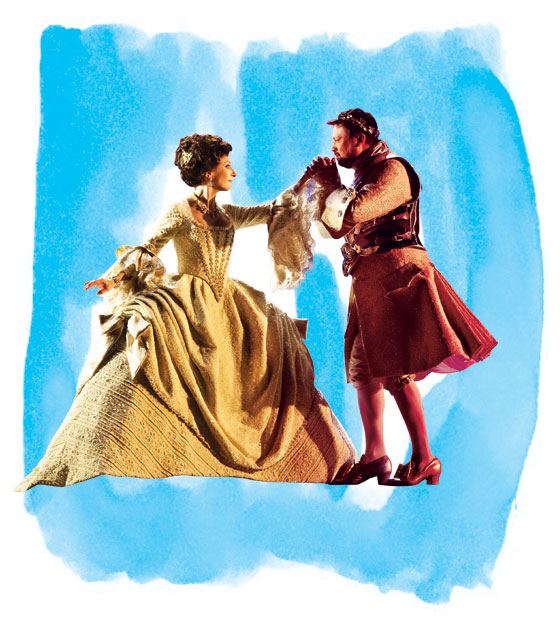
Put on a show as complex and fragile as an opera, and something will usually go at least a little wrong. A piece of scenery will wobble, hay fever will sabotage the tenor’s high note, an oboist might be irritable and distracted, or a scabbard will refuse to accept its sword. We become accustomed to all the little abrasions that produce a dull finish, a certain ordinary vagueness. So when the opposite happens—when you witness something as supple, vivid, and complete as the Metropolitan Opera’s new production of Handel’s Giulio Cesare—the experience comes as a pleasurable shock.
David McVicar created this marvel for the 2005 Glyndebourne Festival, but the staging has lost none of its freshness in its belated move to the Met. Aggressive directors often brandish their conceits and cudgel scores into submission, producing an opera that looks nothing like the way it sounds. But take in any twenty seconds of this Giulio Cesare, and it’s instantly obvious that McVicar has studied, internalized, and fallen deeply in love with Handel’s music.
Respect doesn’t confine his imagination or pinion his wit. He’s plucked the tale of Romans in Egypt out of the ancient world and dropped it in the glory days of the British Empire, without specifying precisely when or where. Costume designer Brigitte Reiffenstuel populates the stage with Indian royals, North African pashas, and red-coated soldiers. A Buster Keaton–ish Cleopatra keeps trying to shove Caesar into the wings while he’s in the throes of his aria “Al lampo dell’armi.” The stage business turns martial bluster into camp, but it’s the momentarily silent Natalie Dessay who does all the comic labor, resting her throat while she works out her body, and letting the ever heroic countertenor David Daniels focus on his splendid singing.
The difficulty in staging this or virtually any Baroque opera is the structure of the eighteenth-century aria, which usually spins out a single extreme affect—grief! elation! rage!—in orderly, repetitive modules. Many directors, fearing stasis, fill the time with empty antics. McVicar fills it with nuance, observing as the sex lives of sovereigns and heroes soften into genuine tenderness. He trusts in Handel—and in Harry Bicket, who conducts hour after hour of music without letting a single measure go blurry or slack.
Dessay’s Cleopatra doesn’t dwell on grandeur; instead she sashays like a silent-movie star, matching the dancers kick for kick and shimmy for shimmy. While her torso swings one way, her voice flies another, caroming around the house with an aerialist’s precision. Dessay has had an erratic few years, and she pleaded illness after this production’s opening night, letting the superstar-in-waiting Danielle de Niese step in for the second evening. A few performances later, her voice and vigor had returned, and she made Cleopatra more than the sum of her mannerisms. It helps that McVicar has an uncanny sense of when to set the stage business aside. Dessay sings her intimate plea for compassion “Se pietà di me non senti” doing nothing more athletic than sitting on the edge of her bed. Stillness takes over, unstoppering a roiling cascade of emotions.
All this depends on a lithe and congenial ensemble. Daniels and Dessay would be great artists even if they were singing in solitude on a highway overpass. But it’s the camaraderie between them, and with the rest of a tight corps, that powers the staging. As Cornelia, mezzo-soprano Patricia Bardon reacts to the gruesome sight of her husband Pompey’s severed head with a shocked shudder and gives the rest of the opera its tragic heft. Her counterweight (and would-be seducer) is Christophe Dumaux, who plays Cleopatra’s brother Ptolemy as an uproarious early Hollywood villain, complete with waxed mustache, but sings with total commitment. The genius of this production lies in the mixture of the deep and the frivolous, the dance of slapstick and sublimity.
Giulio Cesare
George Frideric Handel.
Metropolitan Opera. Through May 10.
